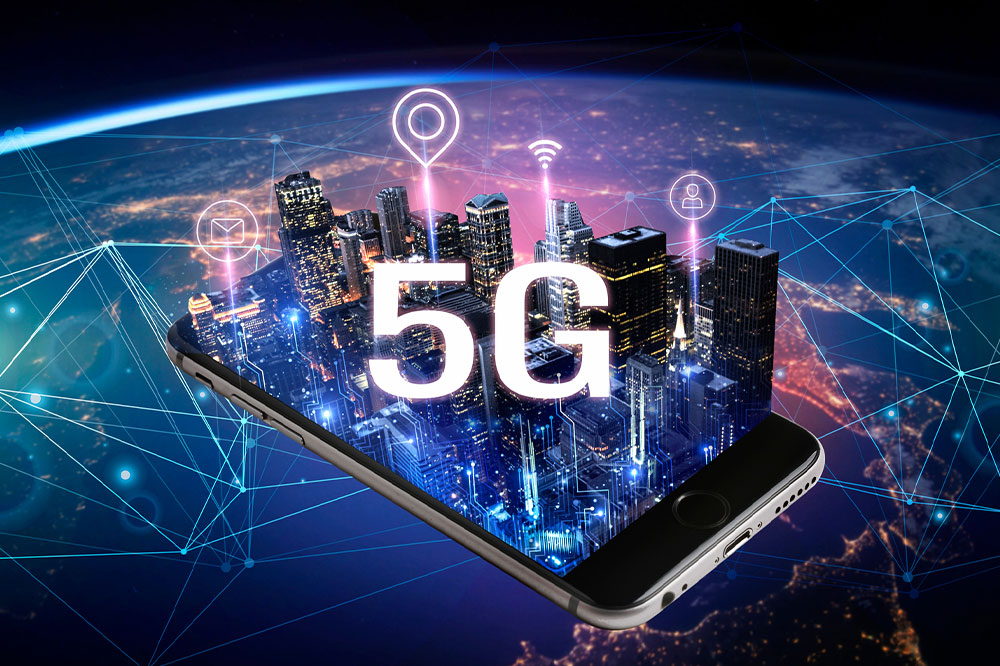5G Network – Benefits, Top Carriers, and Availability
5G is the fifth generation of wireless technology. The network enables connectivity between machines, objects, devices, and people to create a seamless atmosphere. The 5G network has been highly regarded for delivering higher gigabytes per second, better and more reliable performance, and a better network capacity offering wider availability and a more uniform experience, along with ultra-low latency. Owing to its improved performance capabilities, 5G networks are transforming the way users function online.

A look at the other generations
The previous mobile generation networks were:
1G: The first generation focused on voice, delivering the ability to use analog voice connectivity, even when away from home.
2G : 2G connectivity, also known as Personal Communication Services, introduced digital voice, along with a short-messaging layer. This technology allowed multiple users to connect on a single channel via multiplexing.
3G: This generation brought in an internet revolution and speeded up connectivity, causing a boom in smartphone sales across the globe.
4G: 4G and 4G LTE (Long-Term Evolution) have given rise to many connectivity and location services we use today. It paved the way for high-data transfers and mobile broadband, which reduced buffering times dramatically.
5G connectivity is transforming this pre-existing technology and allowing the delivery of newer services by offering 10 times the speed of its predecessor, the 4G LTE. It is meant to impact every industry by making transportation safer and improving remote healthcare, precision agriculture, and digitized logistics.
Benefits over 4G
Not only is 5G faster than 4G, as it delivers up to 20 Gbps, but there are also various other benefits to this new technology. These include:
Higher capacity: 5G technology is designed to support up to a 100 times increase in traffic capacity and network efficiency.
Lower latency: 5G is set to significantly reduce latency, that is, the delay times. This will allow better real-time connectivity and make way for a smoother connection between users.
Better spectrum usage: 5G best utilizes the currently available band networks to extract the most from them. Based on current regulations, the band networks include low-band networks (less than 1GHz), mid-band networks (1GHz to 6GHz), and high bands or millimeter waves (mmWave).
Unified platform: The new 5G technology can support all spectrum types, band types, and a range of deployment models to allow top-speed mobile broadband connectivity for its users. It has also made way for new ways for users to interconnect, such as creating a multi-hop mesh, to facilitate the transfer of information and services. Not only has this transformed user connectivity, but it has also made the availability of mission-critical services like online banking systems, transport control and operating systems, electric power systems, and others possible.
Top 5G network providers
All major network providers offer connectivity to 5G services. As this technology requires testing and regulations, it may not be available across the country yet. The top 5g carriers include:
Verizon: Verizon began its 5G home internet services in 2018 and its Ultra Wideband services in 2019. Currently, the Ultra Wideband services are available in over 1700 cities. The network provider also offers 5G Nationwide, which covers over 2000 cities around the country. The Home Internet plans cost as little as $25 per month and requires no annual contracts or early termination fees. This service has no data caps and offers speeds ranging from 300 Mbps to 1 Gbps, depending on your location. Verizon also offers multiple unlimited 5G plans for mobile users.
AT&T: AT&T started offering nationwide 5G plans in 2020 and is active in thousands of cities. The mmWave spectrum, or the 5G+, is active in over 50 cities, while lower-band 5G connectivity is available in over 22,000 cities and towns. A detailed list of their coverage and plans is available on their website.
T-Mobile and Sprint: Sprint and T-Mobile merged into one company between 2018 and 2020. It was around this time that T-Mobile began offering nationwide 5G services for phones as well as home internet users. With their current mid-band (600 GHz) towers that transmit signals to one thousand square miles, users can expect download speeds of up to 450 Mbps.
US Cellular: US Cellular began its 5G services in 2020. Currently, it offers connectivity in hundreds of cities, with home internet plans beginning at as low as $30 per month.
How do I find 5G cell towers near me?
There are approximately 150,000 5G cell towers all over the country. Currently, the best possible source of finding these towers near you is an application called CellMapper. Open the app and select your wireless carrier under Provider. Select 5G-NR under Network, and it will display the location of cell towers near you.
If you want to find the location of cell towers for specific providers near you, visit their website. Most providers host links for 5G and 4G coverage maps, so you can gain access to detailed network coverage information in your area. Simply look up “map of 5G towers near me” on your browser, or check the “Coverage” tab on your network provider’s website for access to these details.